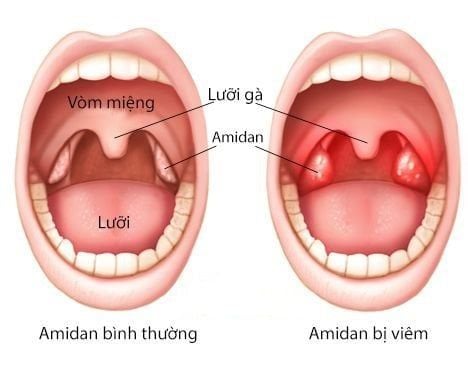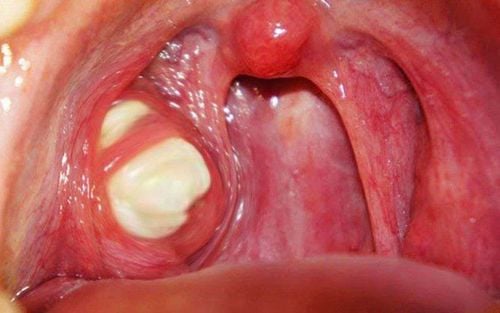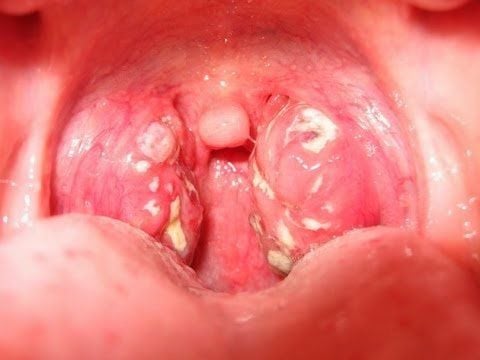This is an automatically translated article.
Tonsillitis is a common disease in both adults and children. The disease usually progresses in stages, may resolve on its own but can also lead to local or systemic complications. Tonsillitis can be acute or chronic inflammation of the tonsils caused by bacteria or viruses.1. Is tonsillitis dangerous?
1.1 Acute tonsillitis Acute tonsillitis is a congestive, exudative, or purulent inflammatory lesion of the tonsils, usually caused by a virus or bacteria. If the disease is caused by a virus, it is usually mild, on the contrary, if it is caused by bacteria, the disease will be severe, especially due to group A β-hemolytic streptococcus, the more severe the tonsillitis. The disease is very common in children and adolescents.Acute tonsillitis usually starts suddenly with a cold feeling and then a fever of 38 - 39 degrees Celsius, an infection syndrome such as: fatigue, headache, loss of appetite, red urine... Patients swallow pain, swallowing problems, feeling of dryness and burning in the throat, especially in the tonsils, sharp pain in the ears, bronchial pain causing intermittent cough, mucus, hoarseness and chest pain.
If the virus causes the disease, the entire pharynx mucosa will become red, exudate, the tonsils are swollen and red, the lymphatic organs in the back of the throat are also swollen, accompanied by the following symptoms: runny nose, cough, hoarse voice, conjunctivitis. The submandibular lymph nodes are not enlarged. If caused by bacteria, the tonsils are swollen and red, the surface has white pus dots or white plaques, and the lymph nodes under the corner of the jaw are swollen and painful.
However, the distinction between viral and bacterial tonsillitis is only relative, sometimes viral tonsillitis can have clinical symptoms similar to bacterial tonsillitis and vice versa. Tonsillitis may go away on its own or in some cases require treatment.
1.2 Chronic tonsillitis Chronic tonsillitis is a recurring inflammation of the tonsils. Normally, due to the body's reaction, the tonsils will enlarge, in the cavities there may be white pus. In contrast, in the elderly, chronic inflammation causes the tonsils to atrophy.
Patients often have a fever, a feeling of itching, burning in the throat, spitting due to secretions, bad breath due to pus contained in the cavities of the tonsils, often a dry cough, especially in the morning when you wake up, hoarse voice light, wheezing, loud snoring at night. If the tonsils swell too much, it can cause difficulty swallowing, breathing, and even sleep apnea in young children.

Viêm amidan mạn tính là tình trạng viêm tái đi tái lại ở amidan
2. Complications of tonsillitis
2.1 Local complications The most common tonsil site complications are: Inflammation or abscess of the tonsils. This phenomenon often occurs when the patient has acute tonsillitis but is not treated in time, causing the tonsillitis to recur many times, causing widespread inflammation. Patients will have sore throat, difficulty swallowing, earache, swollen throat, difficulty speaking, bad breath, salivation, headache, high fever...2.2 Adjacent complications Tonsillitis may be accompanied otitis media, rhinitis, sinusitis, laryngitis - bronchiolitis, submandibular lymphadenitis, inflammation or abscess on the side of the pharynx...
2.3 Systemic complications Tonsillitis is a common complication of glomerulonephritis. kidney, acute arthritis, acute pericarditis, endocarditis, myocarditis, sepsis... Patients may present with other symptoms such as headache, high fever, vomiting, rash, lymphadenopathy ... accompanied by the characteristic symptoms of the disease. In addition, it is also possible to experience sleep apnea syndrome in young children, the tonsils are too large, causing difficulty swallowing, breathing, and pronunciation.
3. Treatment of tonsillitis
Acute tonsillitis: Use broad-spectrum antibiotics, preferably according to the antibiotic chart. Symptomatic treatment: Anti-inflammatory, analgesic, antipyretic, drug to loosen mucus, relieve cough. Local treatment: 0.9% saline nasal drops, gargle or use antiseptic solutions. Patients should rest, eat foods that are easy to digest, rich in nutrients, and drink enough water. Chronic tonsillitis: May require tonsillectomy.4. Measures to prevent tonsillitis

Phòng bệnh viêm amidan bằng cách tránh uống nước đá khi trời lạnh hoặc khi cơ thể đang yếu
Avoid being cold (wear a scarf often, wear warm clothes...), do not drink ice, eat ice cream when it's cold or when the body is weak because it is easy to get sick. Keep your mouth and nose clean by brushing your teeth, rinsing your mouth with physiological saline to avoid infections. Wear a mask when going out or when going to crowded places to avoid breathing in smoke, dust, pathogens that cause pharyngitis, tonsillitis. Active examination and treatment of diseases of the ear - nose - throat or teeth - jaw - face. Improve the body's resistance through physical exercise, building a reasonable diet, avoiding cold. Otolaryngology - Vinmec International General Hospital specializes in examining and treating common ENT diseases such as: tonsillitis, sore throat, tinnitus, non-allergic rhinitis, throat cancer; tumors of the head, face and neck, congenital malformations of the ear, nose and throat area by common surgical methods.
Please dial HOTLINE for more information or register for an appointment HERE. Download MyVinmec app to make appointments faster and to manage your bookings easily.













